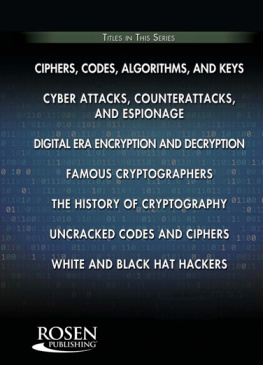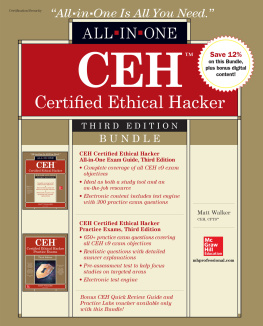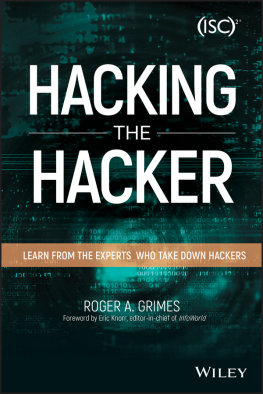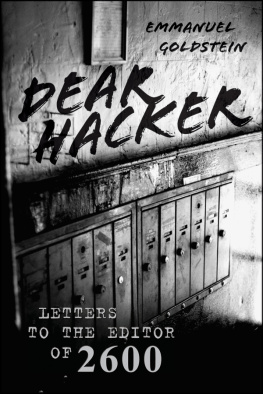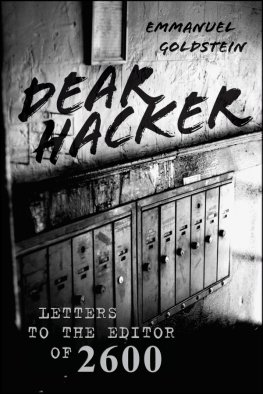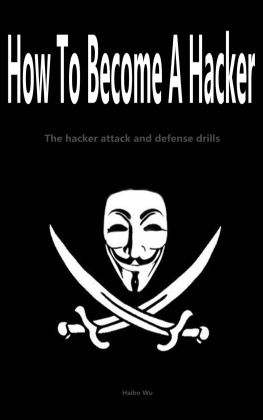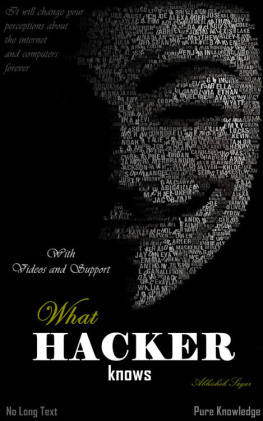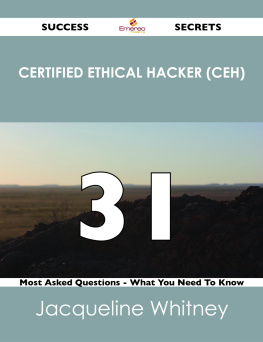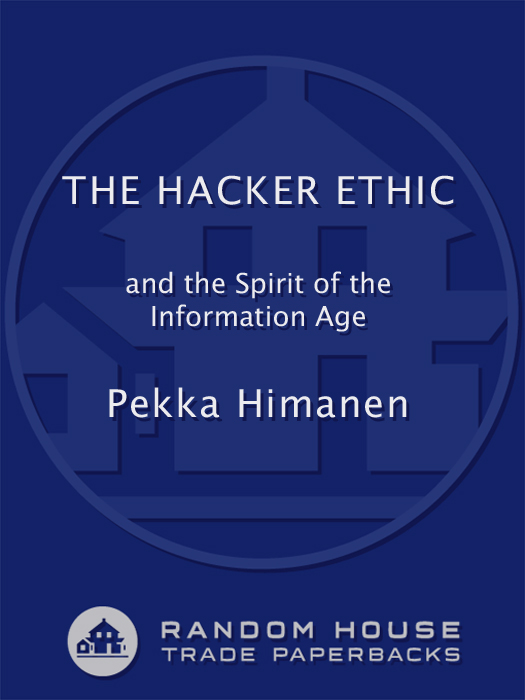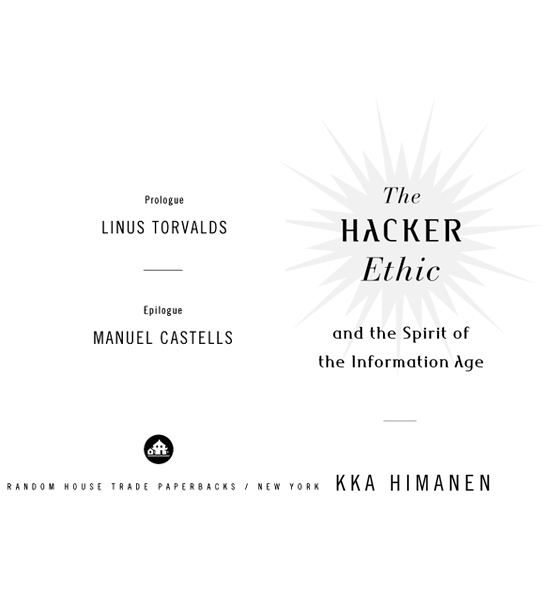Praise forThe Hacker Ethic
[Himanens] survey of the core components of the hacker ethic is as comprehensive and instructive as any to date. Himanen has a powerful grasp on that strangely intoxicating contradiction that is open-source.
The New York Times Book Review
The Hacker Ethic is a brilliant book. This little book blows away the myth that getting important things done requires stodgy and outmoded forms of organization, or a slavish devotion to work. Just the oppositeHimanen demonstrates with modern and historical examples that theres a sea change underway in the way that work happens. This book will be read, re-read, and passed onif youre employed by someone else, I suggest reading it and (as applicable) giving your copy to your boss, former boss or future boss.
Slashdot.org
The Hacker Ethic is engagingly written and provocative, and indubitably commendable in its vision of a transformation of how all of us relate to our working life. We should all be more like hackers.
Salon.com
[A]s computer technology advances, the hacker ethic is a way of living that is becoming more prevalent. Everyone would benefit from being exposed to it.
St. Louis Post-Dispatch
[S]prightly, ruminative essay. The Hacker Ethic rewards readers by making its points in the playful and creative spirit it promotes.
The Philadelphia Inquirer
[T]his is a wonderful little book, engaging, impassioned, and lucid.
Sunday Star Ledger (Newark, N.J.)
Thanks to Pekka Himanen, I have been enlightened. Hackers are good. They play with things until they break, but from breakage comes insight that drives development.
Sarasota Herald-Tribune
Copyright 2001 Pekka Himanen
Prologue copyright 2001 Linus Torvalds
Epilogue copyright 2001 Manuel Castells
Pekka Himanens text translated by Anselm Hollo and Pekka Himanen
All rights reserved under International and Pan-American
Copyright Conventions. Published in the United States by Random House Trade Paperbacks, a division of Random House, Inc., New York
R ANDOM H OUSE T RADE P APERBACKS and colophon are trademarks of Random House, Inc.
This work was originally published in hardcover by Random House Trade Publishers in January 2001.
Grateful acknowledgment is made to the following for permission to reprint copyrighted material:
Richard Stallman: The Free Software Song, by Richard Stallman. Copyright 1993 by Richard Stallman. Used by permission. Verbatim redistribution permitted if this notice is preserved.
Youth Radio, Berkeley, California: E-mails between Finnegan Hamill and Adona. Copyright Youth Radio, Berkeley, California. Used by permission.
Library of Congress Cataloging-in-Publication Data
Himanen, Pekka.
The hacker ethic, and the spirit of the information age / Pekka Himanen.
p. cm.
eISBN: 978-0-307-52958-9
1. Computer programmingMoral and ethical aspects. 2. Computer hackers.
3. Open source software. I. Title.
QA76.9.M65 H56 2001
174.90904dc21 00-053354
Random House website address: www.atrandom.com
v3.1
Contents
Preface
At the core of our technological time stands a fascinating group of people who call themselves hackers. They are not TV celebrities with wide name recognition, but everyone knows their achievements, which form a large part of our new, emerging societys technological basis: the Internet and the Web (which together can be called the Net), the personal computer, and an important portion of the software used for running them. The hackers jargon file, compiled collectively on the Net, defines them as people who program enthusiastically In this book, this distinction between hackers and crackers is observed.)
My own initial interest in these hackers was technological, related to the impressive fact that the best-known symbols of our timethe Net, the personal computer, and software such as the Linux operating systemwere actually developed not by enterprises or governments but were created primarily by some enthusiastic individuals who just started to realize their ideas with other like-minded individuals working in a free rhythm. (Those who are interested in the details of their development may turn to the appendix, A Brief History of Computer Hackerism, for details of their development.) I wanted to understand the internal logic of this activity, its driving forces. However, the more I thought about computer hackers, the more obvious it became that what was even more interesting about them, in human terms, was the fact that these hackers represented a much larger spiritual challenge to our time. Computer hackers themselves have always admitted this wider applicability of their ways. Their jargon file emphasizes that a hacker is basically an expert or enthusiast of any kind. One might be an astronomy In this sense, a person can be a hacker without having anything to do with computers.
The main question transformed into, What if we look at hackers from a wider perspective? What does their challenge then mean? Looking at the hacker ethic in this way, it becomes a name for a general passionate relationship to work that is developing in our information age. From this perspective, the hacker ethic is a new work ethic that challenges the attitude toward work that has held us in its thrall for so long, the Protestant work ethic, as explicated in Max Webers classic The Protestant Ethic and the Spirit of Capitalism (19041905).
To some computer hackers, this kind of linking of the hacker ethic to Weber may at first seem alien. They should keep in mind that in this book the expression hacker ethic is used in a sense that extends beyond computer hackerism, and that for this reason it confronts social forces that are not normally considered in discussions concerned exclusively with computers. This expansion of the hacker ethic thus presents an intellectual challenge to computer hackers, as well.
But first and foremost the hacker ethic is a challenge to our society and to each of our lives. Besides the work ethic, the second important level of this challenge is the hacker money ethica level that Weber defined as the other main component of the Protestant ethic. Clearly, the information-sharing mentioned in the hacker-ethic definition cited above is not the dominant way of making money in our time; on the contrary, money is mostly made by information-owning. Neither is the first hackers ethosthat activity should be motivated primarily not by money but rather by a desire to create something that ones peer community would find valuablea common attitude. While we cannot claim that all present computer hackers share this money ethic or that it is likely to spread into society at large, as we can about their work ethic, we can say that it has been an important force in the formation of our time and that the hackers debate over the nature of the information economy could lead to consequences at least as radical as those of their work ethic.
The third element present within the hacker ethic from the very beginning, touched upon in the cited definition by the phrase facilitating access to information and to computing resources, could be called their network ethic or nethic


